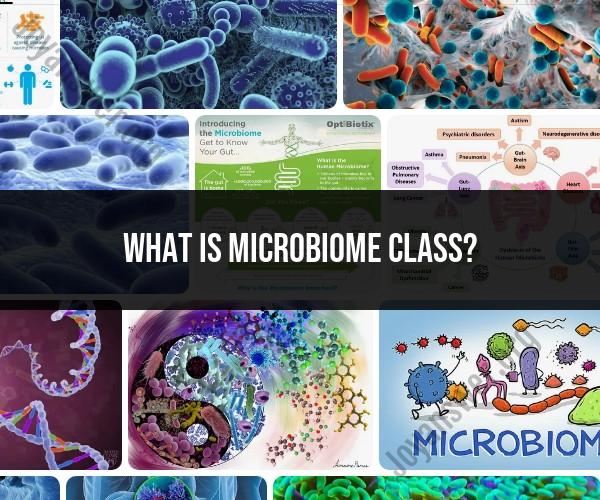What is microbiome class?
A microbiome class typically focuses on the study of the microbiome, which refers to the collection of microorganisms (bacteria, viruses, fungi, and other microbes) that inhabit a particular environment, such as the human body, soil, water, or other living organisms. The class explores the composition, function, and significance of these microbial communities.
Key components covered in a microbiome class may include:
Microbial Ecology: Understanding the interactions between microorganisms and their environment, including factors influencing microbial diversity and distribution.
Human Microbiome: Studying the microbial communities residing in and on the human body, their role in health and disease, and their influence on various bodily functions, such as digestion, immunity, and metabolism.
Microbiome Diversity: Exploring the diversity of microorganisms and their genetic composition within different ecosystems and how this diversity impacts ecosystem functions.
Techniques in Microbiome Analysis: Learning laboratory techniques, such as DNA sequencing, metagenomics, and bioinformatics, used to study and analyze microbial communities.
Applications in Medicine and Research: Understanding the implications of microbiome research in various fields, including medicine, agriculture, environmental science, and biotechnology.
Gut Microbiome and Health: Delving into the role of the gut microbiome in human health, including its influence on digestion, immune function, and potential associations with diseases like obesity, autoimmune disorders, and mental health conditions.
Microbiome classes are often interdisciplinary, drawing from fields such as biology, genetics, ecology, medicine, and bioinformatics. They aim to provide students with a comprehensive understanding of the complex microbial communities that exist in different environments and their impact on living organisms and ecosystems.
As the study of the microbiome continues to evolve, these classes contribute to advancing our understanding of the roles these microbial communities play in maintaining health, influencing disease, and impacting broader ecological systems.
What topics are covered in a microbiome class?
The specific topics covered in a microbiome class can vary depending on the level of the course, the instructor's focus, and the institution offering it. However, there are some core areas that you can expect to encounter in most microbiome classes:
Core Topics:
- Introduction to the Microbiome:
- Definition and composition of the microbiome in different body sites (gut, skin, lungs, etc.)
- Microbiome diversity and its impact on health
- Factors influencing the microbiome (diet, lifestyle, medications, etc.)
- Microbial Ecology:
- Symbiotic relationships between microorganisms and humans
- Competition and cooperation within the microbiome
- Microbial community dynamics and stability
- Microbiome and Human Health:
- Role of the microbiome in digestion and nutrient absorption
- Impact of the microbiome on immune function and inflammation
- Links between the microbiome and various diseases (obesity, diabetes, cancer, etc.)
- Methods for Studying the Microbiome:
- DNA sequencing technologies and bioinformatics analysis
- Metagenomics and metatranscriptomics for functional characterization
- Culturing and isolation of specific microbial strains
- Applications of Microbiome Research:
- Personalized medicine and targeted probiotics
- Development of novel therapeutics and diagnostics
- Prebiotics and dietary interventions for microbiome modulation
- Ethical and legal considerations:
- Data privacy and ownership concerns related to microbiome research
- Regulation of microbiome-based therapies and products
Additional Topics (depending on the course):
- Microbiome analysis pipelines and tools
- Microbial virulence and pathogens
- Phage therapy and microbiome engineering
- Environmental and global microbiome research
- Gut-brain axis and neuroimmune interactions
- Evolutionary aspects of the microbiome
Resources:
To get a better understanding of the specific topics covered in a particular microbiome class, you can:
- Consult the course syllabus or website provided by the instructor.
- Contact the instructor directly for specific details.
- Research online resources like the Human Microbiome Project website or scientific publications.
Remember, the field of microbiome research is constantly evolving, so keep an open mind and be prepared to learn about new discoveries and insights into the complex world of microorganisms living within us.
I hope this information helps you navigate the vast and fascinating area of microbiome studies! Feel free to ask if you have any further questions about specific topics or resources related to the microbiome.












